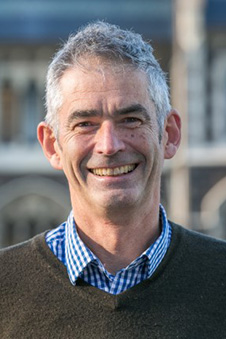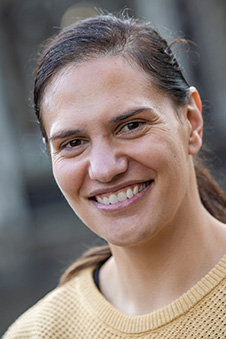There are likely to be several hundred Māori unaware they are at high risk of an inherited form of stomach cancer and a New Zealand research team is hopeful updated international clinical practice guidelines they helped develop will encourage these people to be tested.
The University of Otago and the Kimihauora Health and Research Clinic's (Mt Maunganui) work in understanding the role of variants (mutations) in the I gene in familial stomach cancer and the subsequent development of a genetic test, has dramatically reduced the number of deaths from this form of inherited cancer.

Professor Parry Guilford.
Professor Parry Guilford, who led the Otago team, says there are likely to be many Māori who have no idea they have the faulty gene and who are at high risk from the cancer and an elevated risk of breast cancer.
"It's not a common cancer, but there are likely to be several hundred Māori who are at high risk of stomach cancer because of this gene and not all of them will be aware of that risk.
"Germline (inherited) mutations in the CDH1 gene lead to both a high risk of stomach and lobular type breast cancer. Some families get more of one and less of the other. We don't see much breast cancer in the New Zealand families, but many North American families in particular seem to only get breast cancer."
Māori have rates of stomach cancer three times higher than people of European descent. It is one of the few populations for which diffuse-type is more common than the intestinal-type stomach cancer. Many risk factors have been identified but the reasons behind the increased rates, and more common diffuse type stomach cancer in Māori are not completely clear; although a relatively high frequency of the inherited CDH1 variants in the Māori population is one important reason.
Updated clinical practice guidelines, developed by Professor Guilford and an international team of clinicians, researchers and family advocates, have just been published in The Lancet Oncology.
"We have been able to include a specific genetic testing criteria for Māori in the updated guidelines," Professor Guilford explains.
"It is very uncommon in international guidelines to single out sub populations, so this is quite a significant move that we hope will reduce their risk as well as helping to reduce inequities in health for Māori."

Dr Karyn Paringatai. Photo: Sharron Bennett.
Senior Lecturer in Te Tumu – the University of Otago's School of Māori, Pacific and Indigenous Studies, Dr Karyn Paringatai, is one of those whose whakapapa (extended family) has been infiltrated by the genetic variant.
She herself underwent testing and had her stomach removed 10 years ago after she was made aware of the testing available by her aunties.
The decision to undergo surgery was not an easy one to make. “I did it to prevent gastric cancer from developing. People thought I was crazy. It was the most difficult thing I've ever been through, but also the most rewarding. I chose to live a life free of fear,” she explains.
Dr Paringatai was involved in the development of the new guidelines.
“I'm excited that these guidelines insist that testing become more easily accessible. Whānau need to be empowered in this whole process.”
Previously, the guidelines were largely based around the number of cases of this cancer in a family. The new guidelines recommend the whānau of any Māori person who has been diagnosed with diffuse stomach cancer be encouraged to have a genetic test, regardless of any other family history.
The updated guidelines are especially important to one of the research project's founders, nurse Maybelle McLeod from Kimihauora Health and Research Clinic, who also helped develop the guidelines.
Concerned about the large number dying from the disease in her whānau, she approached the Health Research Council in 1994 for funding to employ a scientist to search for answers. Some of the family believed they had a makutu (curse) placed on them after selling their land several years before for quarrying purposes, and that the cancer was a punishment.
In 1997, Professor Guilford and his team, in close collaboration with Kimihauora and affected whānau, discovered the genetic variant that was responsible for the stomach cancer – the CDH1 gene.
Ms McLeod estimates that between the 1950s and up until the research team's discovery, up to 50 members of her whānau had died from the disease. Since the testing and resulting stomach-removal surgery, two have died.
Singer, songwriter Stan Walker is one of the more high-profile New Zealanders to have benefited from this research, with the faulty gene being detected in Walker's DNA and his life saved after undergoing surgery removing his stomach.
Ms McLeod is excited about the development of the updated guidelines.
"This is another step forward in the detection of stomach cancer which will hopefully ensure more people with the disease are identified at an earlier stage, therefore resulting in fewer deaths."
For further information, contact:
Professor Parry Guilford
University of Otago
Tel +64 3 479 7673
Email parry.guilford@otago.ac.nz
Dr Karyn Paringatai
Te Tumu – School of Māori, Pacific and Indigenous Studies
Tel +64 3 479 8122
Email karyn.paringatai@otago.ac.nz
Maybelle McLeod
Email kimihauora@gmail.com – Attention Maybelle McLeod
Kelly-Ann Tahitahi
Communications Adviser (Māori)
University of Otago
Tel +64 3 479 9139
Mob +64 21 279 9139
Email kelly-ann.tahitahi@otago.ac.nz
Liane Topham-Kindley
Senior Communications Adviser
University of Otago
Tel +64 3 479 9065
Mob +64 21 279 9065
Email liane.topham-kindley@otago.ac.nz
FIND an Otago Expert
Use our Media Expertise Database to find an Otago researcher for media comment.